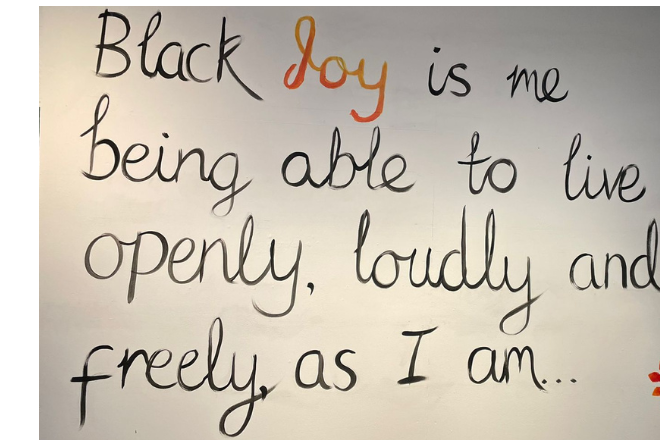

In this blog Sorcha Daly from The Hepatitis C Trust shares some initial learnings from the co-production of their Volunteer Survey, an ongoing project that is evaluating the impact of volunteering at the Trust.
The Hepatitis C Trust is a peer-led organisation, meaning that the majority of its staff and volunteers have been either infected or affected by hepatitis C. Peer volunteers at the Trust help to identify, test and treat people with hepatitis C. The Peer Researcher team is drawn from this group of volunteers and is mostly made up of people who are in recovery from long term injecting drug use and, as such, also have a long history of exclusion from mainstream services, such as health, housing, and education. For many of our Peers, early in their recovery from addiction, volunteering at the Trust is one of many steps towards a more structured lifestyle, a chance to give back and get valuable experience.
This is what some of our Peer Researchers said about what they get out of being involved in our research projects:
‘The best thing about being a peer researcher is being included in things that I never thought I would be a part of when I was not in recovery’
‘After all the years of being ‘just an addict,’ to have my voice heard is simply priceless.’
‘The best thing about being a peer researcher is that the lived experience we’ve all been through is now being useful instead of being shameful.’
‘….that my life experience and my opinions and views are assets today which the research group helps me evolve and input to help others.’
The Peer Researcher team aims to ensure that the research and evaluation carried out by the Trust is more equitable and relevant to the people it serves. Since its inception in April 2022, the group has participated in a range of research and evaluation projects. This includes our current project to co-produce a survey designed and delivered by the Peer Researchers to find out the impact of volunteering at the Trust on factors such as mental health, confidence, personal and professional relationships and job readiness. Prior to co-producing the volunteer survey, research training was provided to all Peer Researchers, on topics such as confidentiality, data protection, research ethics and informed consent. Guest appearances at our Peer Researcher meetings by other key members and departments of the Trust also took place introducing the Peer Researchers to topics such as effective communications and our policy and campaigns work. These activities also helped our Peer Researchers feel included and part of the wider organisation when there were delays or gaps in the Trust’s research work. Some of our Peer Researchers told us that they found stepping back into an academic environment daunting, especially those who have had a negative experience of education in the past and very little work experience. Informal and ad hoc training and support around IT skills and diary management has also been provided to build skills and confidence.

For the Volunteer Survey, our research team first needed to understand what type of questions would be relevant to the peer volunteer’s experience. We wanted to make sure we were focusing on the right aspects and issues of volunteering at the Trust, so we met with the Peer Researchers to discuss this. Conversations during the meeting brought up issues of confidence and self-esteem, the highs and lows of their recovery journey and the importance of feeling like they were part of ‘creating change’ and ‘challenging stigma.’ We incorporated these points into the survey as well as a ‘research journal’, so Peer Researchers could note down any positives, challenges and other thoughts relating to the interview.
Once the survey was finalised with the Peer Researchers we asked them to ‘pilot’ the survey with each other. This gave them a chance to practice their interviewing over the phone, whilst at the same time finding out if and how the survey worked in practice. After the initial pilot we met as a team to discuss how the survey went. The Peer Researchers enjoyed conducting the interviews but, as they weren’t being recorded, they sometimes found it difficult to record everything that was being said. Initially, we had included as many open-ended questions as possible, to allow for more of a discussion to take place. However, the Peer Researchers reported long silences as they noted down people’s responses and didn’t feel altogether comfortable with this. They were also worried that they were not capturing everything that was said, which was particularly true for those who are dyslexic. We decided to include more tick box responses and some Likert scales that measured levels of confidence and mental health before and after volunteering at the Trust. Once the adapted survey was underway, Peer Researchers noted that it flowed better and was easier to record answers.
Here some of the peer researchers share their experiences:
‘It was a brilliant experience putting together the survey, documenting our peers experiences, their commitment and passion for raising awareness and elimination of hepatitis C and views for future improvements of the Trust, it was a pleasure to be involved.’ Gary, Peer Researcher, The Hepatitis C Trust
‘Participating in the survey has helped me, first and foremost, connecting with people I wouldn’t normally have access to, secondly, with my reading and writing, and also my interviewing skills. It’s been an absolute privilege to meet and connect with interviewees on a human level, they have been absolutely amazing and I feel quite humbled to have interviewed them all.’ Vinnie, Peer Researcher, The Hepatitis C Trust
Considerations while co-producing the survey with the Hepatitis C Trust Peer Researcher Group

Timescales for the completion of the survey have had to be considered carefully and extended considerably. It took time to schedule calls with volunteers on the phone. Both the Peer Researchers and Trust volunteers have busy lives with a range of volunteering, employment and recovery commitments. With this in mind, it was important to consider the material, emotional and psychological resource needs of the Peer Researchers. To avoid using the Peer Researcher’s personal phones, burner phones and laptops have been sourced for them and regular ‘check ins’ to see how they are, are important. It would be easy to overload the team at a time when their psychological or emotional resources are low and this always needs to be taken into consideration when working with people who have a history of mental health support needs and substance dependence.

Luckily, as individuals and as a group, the Peer Researchers are mindful and insightful about their own and others mental health and offer mutual care and understanding to each other regularly. Our WhatsApp group is used for updates, questions and concerns, but also as a platform to offer support and encouragement.
Where have we got to so far and what’s next?

After receiving some preliminary results of the survey, it is striking to see the impact that volunteering has on the confidence and mental health of people with experience of hepatitis C and injecting drug use. So far, the data shows that the impact is overwhelmingly positive, and this was also obvious in the feedback that Peer Researchers gave about their interviews. With this in mind, it was felt that we might be missing out on some key verbatim quotes that could demonstrate the experience of volunteers at the Trust. We decided to record some of the interviews conducted by the Peer Researchers on Microsoft Teams calls. From witnessing these interviews, it became obvious that these interactions were very different from those that might develop between a researcher with no lived experience of injecting drug use or hepatitis C and a peer volunteer. The fact that the peer researchers have similar backgrounds to the volunteers they were interviewing clearly put them at ease and more open to sharing their experiences in more depth, making for much richer and meaningful data.
Our next steps, once we have completed all the interviews, will be to hold some workshops with the Peer Researcher team to discuss themes emerging from the interview data. This will enable them to co-produce the analysis of the data. The research journals they have been filling out after each interview will support this co-produced analysis. As ‘insiders’ with knowledge and understanding of substance use and recovery based language, the Peer Research Group’s interpretation of the data is likely to be far more insightful and closer to its true meaning. We look forward to exploring our similarities and differences in interpretation and publishing the findings in multiple formats to ensure accessibility to all.
If you have any feedback or question about this blog, please contact Sorcha Daly on Sorcha.daly@hepctrust.org.uk
Photo credits
Title image: ‘Peer Training’ © Vincent Condron, Peer Researcher, The Hepatitis C Trust, 2022
Image 1: Gif posted in the Peer Researcher WhatsApp group by Beckie B, Peer Researcher, The Hepatitis C Trust
Image 2: Experiencing stigma © Vincent, Peer Researcher, Hep C Trust, 2022
Image 3: WhatsApp messages from Peer Researchers to each other
Image 4: Message from Becky, Peer Researcher, Hep C Trust
Image 5: Research Journal, Hepatitis C Trust Peer Researcher Team





.png)

.png)
.png)


.png)
.png)
.png)